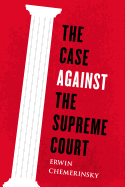
Erwin Chemerinsky (the dean of UC-Irvine's law school) is known to a generation of law students as the author of their constitutional law textbook, which carries them through an analysis of the function and powers of the U.S. Supreme Court. In The Case Against the Supreme Court, Chemerinsky marshals the list of "landmark" court cases, but takes a different tack. Arguing that the purpose of the Constitution and the Court is to protect fundamental individual rights against institutional power--whether governmental or business--Chemerinsky builds the case that the Supreme Court has failed in this task at some critical points in U.S. history.
Chemerinsky takes a topic-based approach, starting with the contentious category of race. He begins with Prigg v. Pennsylvania, the 1842 case that struck down Pennsylvania's law prohibiting the use of "force or violence" to capture escaping slaves. With a variety of famous examples, including the Dred Scot trial, Chemerinsky illustrates that the Court has deferred to institutional oppression at precisely the moments when individual rights needed the most affirmation.
To suggest repairs, Chemerinsky focuses on what he considers the exemplary work of the Warren Court from 1953 to 1969. He suggests that under Chief Justice Earl Warren, the court's approach to cases like Brown v. Board of Education and Miranda v. Arizona is a model for the protection of individual rights. Occasionally shocking and thoroughly argued, The Case Against the Supreme Court offers a readable introduction to constitutional law and a clear message about the importance of questioning the Court's "objectivity" when individual rights are at stake. --Dani Alexis Ryskamp, blogger at The Book Cricket

